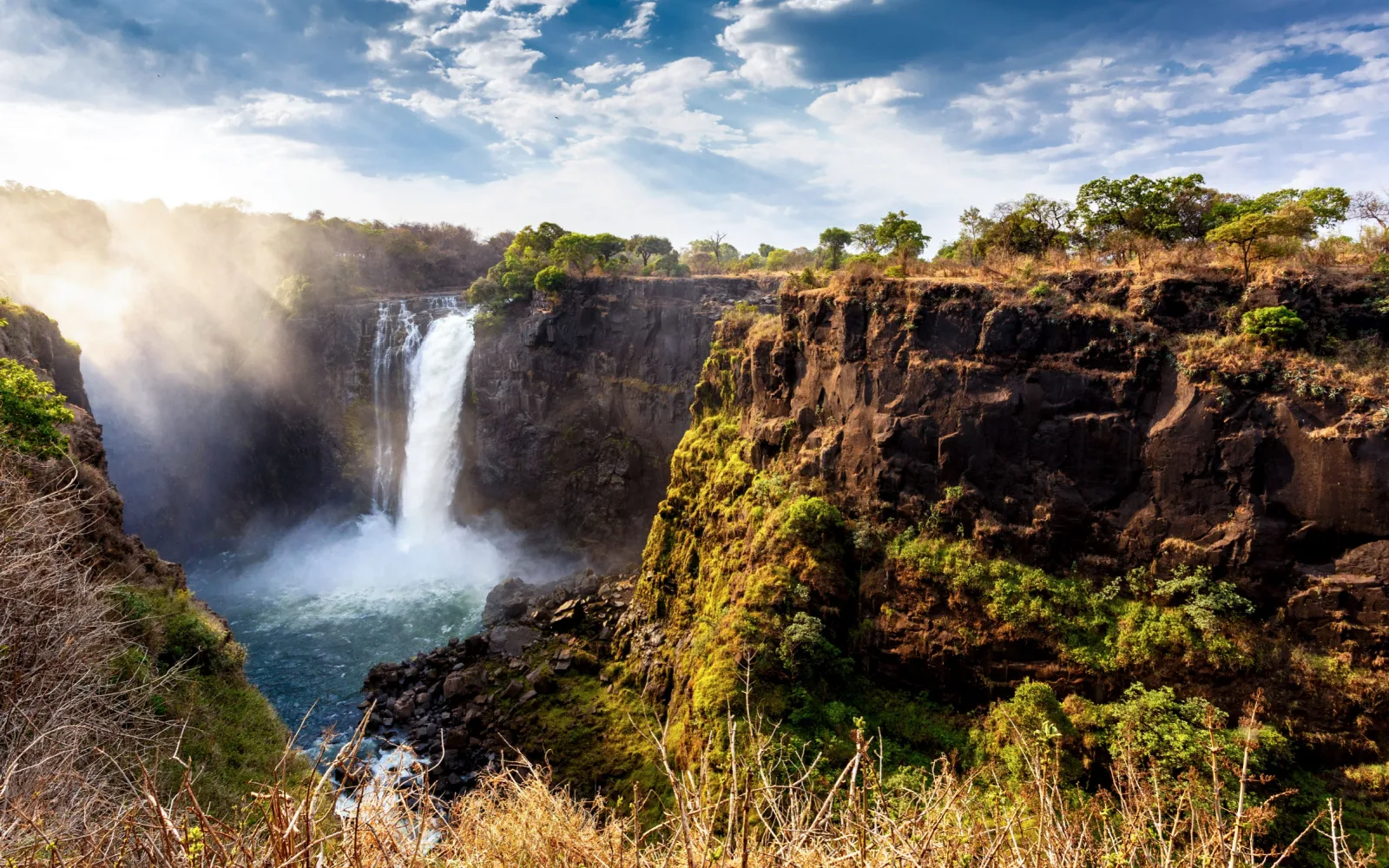Zambia is a popular tourism destination for those looking to check out the charms of the African continent. Although COVID-19 impacted its tourism industry, the country received over 1 million visitors at the peak of tourism in 2019.
Most visitors come to Zambia to see the beautiful nature. Zambia is home to Victoria Falls, one of the largest waterfalls in the world, and Lake Tanganyika.
The country has over 20 national parks that are far less crowded than their South African counterparts and are wonderful places to go on safari. But while this amazing place is rich in culture, history, and natural beauty, is Zambia safe to visit? Here’s our take.
Is Zambia Safe to Visit in 2026?
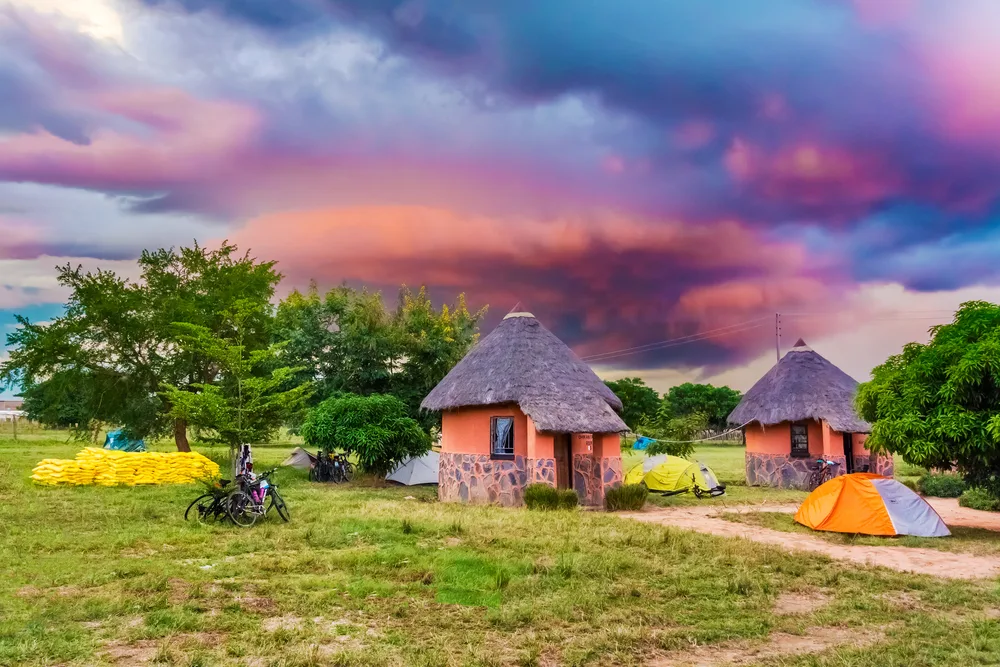
Marek Poplawski/Shutterstock
Yes. Zambia is mostly a safe country to visit and one of the safest in Africa, and most visitors here have a wonderful time free of any trouble.
However, you should exercise precautions in major cities and other crowded areas, especially after dark. Foreign travel advisories reflect the fact that Zambia is a fairly safe country.
The United States doesn’t have any advice for travelers to Zambia, just telling its citizens to exercise normal precautions. It puts the country under a “Level One” travel advisory, the lowest possible rating.
Other countries do advise their citizens to exercise a bit more caution in Zambia.
For example, New Zealand tells its citizens to exercise increased caution when traveling to Zambia. Other travel advisories just tell people to exercise caution in certain regions of Zambia that are less safe.
In travel advisories, frequent concerns that governments mention include:
- Petty theft
- Vehicle break-ins
- Armed robbery
- Home invasion
- Carjacking
- Civil unrest
However, these crimes are all easily avoided with a few precautions. They mostly occur in certain areas of the country, such as Lusaka and Copperbelt.
Most visitors to Zambia make a beeline for the national parks anyway, getting away from urban areas, and there is little crime in rural areas such as the national parks. Civil unrest is fairly common in Zambia.
The Zambian government has come under fire for restrictive laws, such as one unfairly limiting the activities of independent NGOs.
Protests are often met with violence from state authorities, such as the violence in the lead-up to the 2021 elections. Demonstrations are most likely in the capital Lusaka.
If you see a crowd gathering, it’s best to get out of the way as the situation might be unpredictable. In terms of natural disasters, the most common ones that affect Zambia are droughts and floods.
Climate change has exacerbated the frequency of these events. Zambia occasionally implements water rationing measures due to drought, so read up on those measures before you go and obey them out of respect for your hosts.
Crime in Zambia
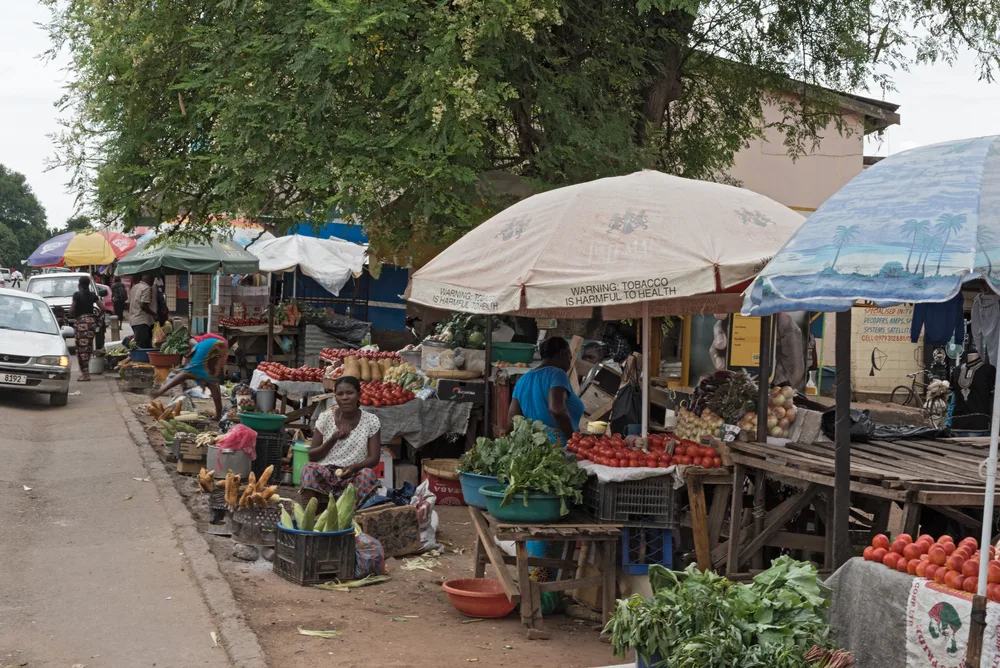
LIVINGSTONE, ZAMBIA-NOVEMBER 23, 2017: market stalls and sellers in Livingstone, Zambia/Rainer Lesniewski/Shutterstock
Crime is the most common reason visitors are concerned about visiting Zambia — and with good reason. The country does have an elevated crime rate, although it is not nearly as bad as some other African countries, such as South Africa.
The violent crime rate in Zambia is fairly high. According to World Bank data from 2015, the homicide rate is five incidents per 100,000 people.
The good news is that most of these homicides are due to gang violence and rarely affect tourists. The property crime rate in Zambia is also very concerning. According to Numbeo, Zambia scores a 39.77 out of 100 on the crime index, which is a moderate crime rate.
Residents and ex-pats report the highest levels of vehicle break-ins, petty crimes such as theft, residential break-ins, and muggings. According to Zambian police data, there is some good news.
Crime generally has been trending downwards over the past few decades. Most crime incidents in Zambia occur in Lusaka, the capital, and the Copperbelt provinces, which are a resource-rich area near the border of the Democratic Republic of the Congo.
Still, Zambia has a long way to go before it can be fully safe for residents and visitors alike. There are a few reasons why the crime rate in Zambia is so high.
One potential problem is the relatively high rate of organized crime. Zambia scores a 4.93 on the Global Organized Crime Index. Organized crime groups are behind problems such as modern slavery, illegal logging, illicit mining, and heroin trafficking.
The prevalence of organized crime points to another problem within Zambian society that affects overall criminality, which is corruption. According to Transparency International, a global NGO that measures corruption, Zambia ranks 116th out of 180 countries on the index.
Zambia also has high levels of poverty and income inequality, which contribute to the high property crime rate.
Most crimes in urban areas such as Lusaka are crimes of opportunity that target symbols of wealth such as affluent residences and luxury vehicles, which shows that they are fueled by resentment and survival.
Finally, Zambia has the misfortune of bordering the Democratic Republic of the Congo, a state that has been collapsing in unrest for decades. Trouble often spills over the porous border, and Congolese gangs are behind many criminal activities in the north of Zambia.
Petty Theft
Despite the alarming statistics about Zambia’s crime rate, the most common crime you are likely to encounter during your trip there is still petty theft.
The Canadian government includes information about petty crime in its official travel alert for Zambia.
It notes the prevalence of theft, such as pickpocketing and bag snatching, in some places around Zambia, such as the capital Lusaka, the Copperbelt province, and other major tourist centers.
In Lusaka, pickpockets often operate in shopping centers, around public bus stations, and near nightclubs because they know those are areas where foreigners visit. Some basic precautions are usually enough to protect you from pickpockets in Zambia.
Make sure that you don’t flaunt your valuables, such as expensive jewelry or a wallet full of cash. Zambia still suffers from high poverty rates, and your phone may cost as much as someone’s salary for several months.
Never leave your valuables unattended, especially in crowded areas. You may not need a money belt, but you should put your valuables in a safe place, such as a zipped pocket of your day bag.
Be careful of common tourist scams such as false money changers. Only change money at official exchanges or banks or withdraw the local currency from a reputable ATM.
Government officials will sometimes scam travelers by adding on “mandatory” fees, so always ask for a receipt when you’re asked to pay something.
Vehicle break-ins are another common form of petty theft. Thieves target rental cars and more expensive vehicles such as 4x4s and luxury vehicles. Never leave your belongings unattended in your car.
Armed Robbery
More violent forms of crime are also a risk in Zambia. Armed robbery can also affect tourists, particularly in Lusaka and Copperbelt.
The Australian government warns about the prevalence of armed robbery, particularly in certain parts of Zambia. Almost all of these robberies occur at night, so a good precaution to take is to limit your movements to daytime.
If you are out and about after dark, make sure that you stay alert to your surroundings. Don’t do anything after dark that might attract unwanted attention, such as changing money at night, withdrawing from an ATM, or flashing lots of cash.
Many robbers target people who just withdrew money from an ATM, so only use ATMs inside secure buildings such as banks. One type of armed robbery that is prevalent in Zambia is carjacking.
Roads near the Congolese borders are often territory for Congolese gangs that attack travelers. Again, most of these attacks happen after dark, so a good precaution to take is to only travel during the day.
The UK government also offers other advice for avoiding carjacking, such as making sure that your doors and windows are locked at all times.
If you notice someone stopped by the side of the road or a roadblock, avoid it as best as you can, as these are tactics gangs often use to force their victims to stop.
Avoiding Bad Areas
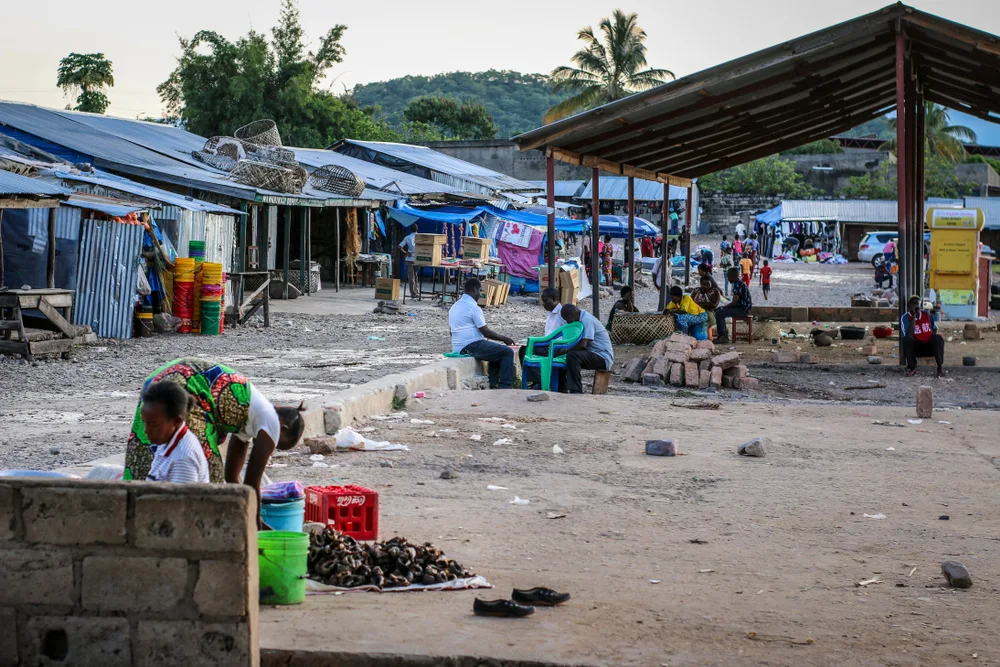
MPULUNGU, NORTHERN PROVINCE, ZAMBIA – 2018. Colourfully dressed Merchants Trading Fresh and Dried Fish amongst other Products at the old Harbour and Marketplace in Mpulungu/Robin Nieuwenkamp/Shutterstock
Most crime in Zambia is concentrated in certain areas, so avoiding those areas can ensure you have a good time.
The capital Lusaka is home to most of Zambia’s crime, which is one of the reasons why most tourists get out of the city as soon as possible and head to Zambia’s natural wonders.
Certain neighborhoods are more dangerous parts of the city, such as the shanty towns of Chibolya and Kanyama or along the railroad. Avoid the Copperbelt province, as it also has an elevated crime rate.
Avoid the area near the Democratic Republic of the Congo border, as the border area still has landmines. Plus, the risk of crime is higher here due to the prevalence of Congolese gangs.
For example, the Mufulira to Ndola road is one of the carjacking hotspots for Zambia. Other areas with landmines include the Angola and Mozambique borders.
Things to Consider
Here are a few additional safety tips for Zambia:
- Road fatalities are the leading cause of death in Zambia due to poor road conditions and bad driving habits. Most road fatalities occur after dark, so only travel around the country during the day.
- Unfortunately, drink spiking is a regular occurrence in Lusaka’s bars, nightclubs, and even restaurants, where your meal could be drugged. Keep a close eye on all of your food and drink.
- When exploring Zambia’s nature, follow precautions. Don’t get too close to wild animals while on safari, as they could hurt you.
- Insect-borne diseases such as malaria are common, so take precautions such as frequently spraying bug spray. Water-borne illnesses such as cholera are also common, so only drink bottled water.
Frequently Asked Questions
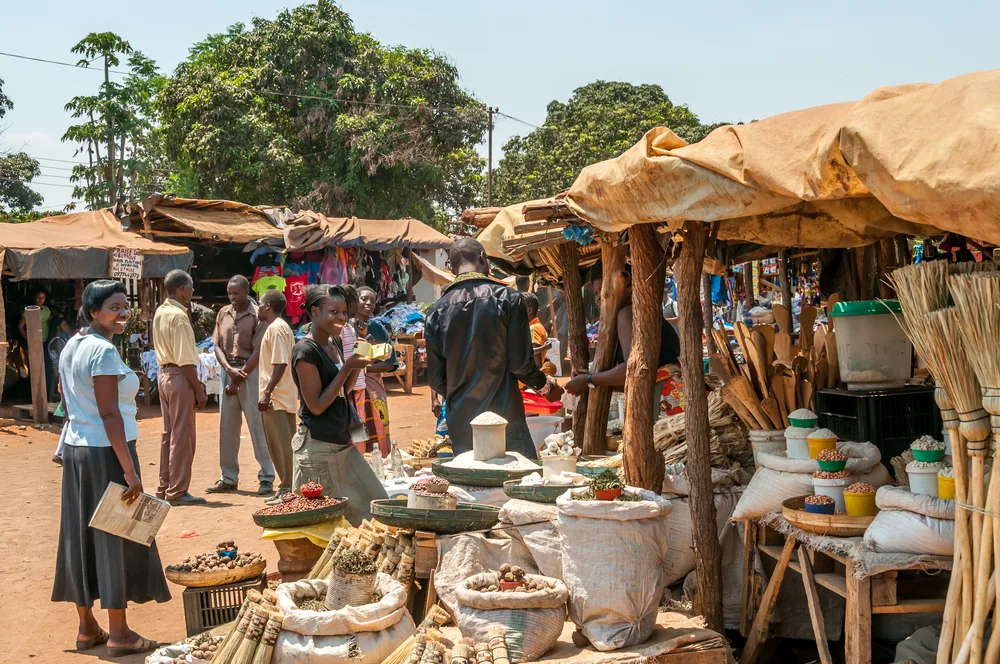
Milosk50/Shutterstock
Here are some common questions travelers to Zambia have asked in the past:
Is Zambia a friendly country?
Yes, Zambia is a friendly country, and Zambian culture prioritizes hospitality toward visitors. Although the crime rate is high, that doesn’t mean that all Zambians are criminals, and the vast majority are just people trying to make a living.
Is Zambia safe for female travelers?
Zambia is safe for female travelers; in fact, it is one of the safer countries in Africa. The local culture is conservative, so female travelers are often expected to stick to a dress code or code of conduct. The only risk female travelers might run into is the problem of drink spiking.
Is Zambia cheap or expensive?
The cost of living in Zambia is lower than in Western countries, but traveling around the country is not for budget travelers. Accommodations in national parks can be pricey, as can safari tours and the price of getting around the country.
What threat level is Zambia?
Most countries assess Zambia to be at a minimal threat level. Some countries, such as New Zealand, place it under a Level Two threat level because of the high crime rate.
Is Zambia safer than South Africa?
For the most part, Zambia is safer than South Africa, with the exception of a few regions, such as the Congolese border. Although crime is present, it is not everywhere as it is in South Africa.
So, Is Zambia Safe to Visit?
Zambia is safe to visit as long as you follow the instructions when you go on safari. Places such as Lusaka and the Copperbelt province have higher crime rates.
However, these are usually not where tourists spend most of their time anyway, and crime rarely occurs during the day. Take some basic precautions, and you should have a good time.
So, with so much to see and do, friendly locals, amazing food, and rich history, what are you waiting for — book your trip to lovely Zambia today. Happy travels!



